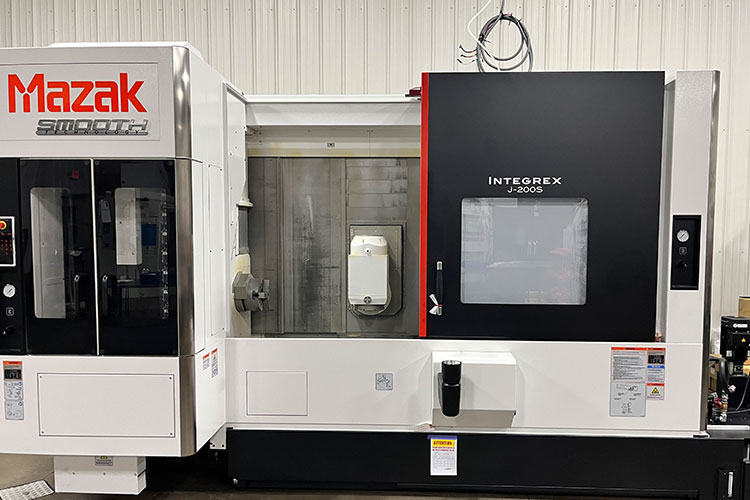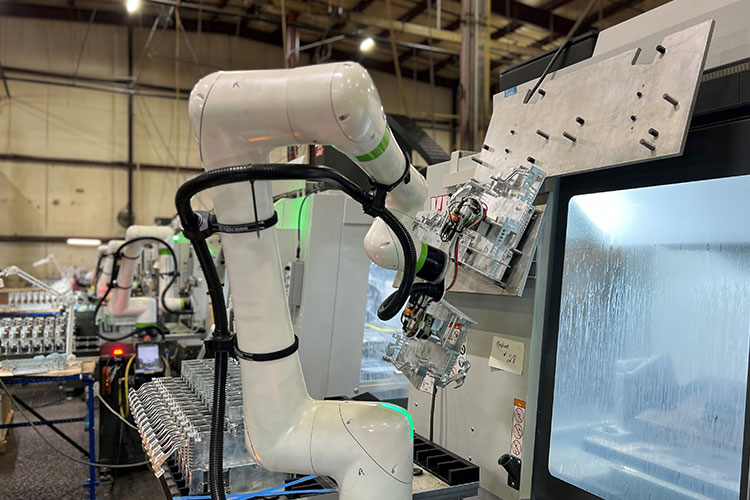
Waséyabek Development Company
A Tribally owned holding company worked with the MEDC’s Tribal Grant program to help two companies in its portfolio overcome barriers for growth
Organized in 2011, Waséyabek Development Company, LLC (WDC) is a 100% Tribally owned holding company managing the Nottawaseppi Huron Band of the Potawatomi’s non-gaming economic development activities. By fostering the development of a stable, diversified economy for members of the Band, WDC seeks to contribute to the Tribe’s long-term sustainability and economic self-sufficiency by providing revenue and diverse employment opportunities for Tribal members.
Located in the downtown business district of Grand Rapids, WDC implements an investment strategy for acquiring companies and income properties throughout its target market. As part of its commercial business division, WDC purchased Baker Engineering (Baker) in 2018 and RSI Manufacturing (RSI) in 2020.
When Baker and RSI were each met with barriers for growth, WDC worked with Tribal partner Michigan Economic Development Corporation (MEDC) to utilize its Tribal Grant program services. The MEDC Tribal Grant program provided overview, explanation of qualifications and guidance to prepare and submit proposals. WDC was excited to learn of the program and how it may help to provide resources to its portfolio companies – including Baker and RSI – that would allow them to modernize their capabilities, create new skilled employment opportunities and help grow their businesses.
Baker Engineering
Meanwhile, Baker’s strategy is to design and manufacture its own product line of advanced power system components with higher precision and quality, faster setup and cycle times, at a lower production cost. Previous capabilities were limited, and Baker needed to modernize its prototype and production machining capabilities to include a new 5-axis multi-spindle machining center.

In FY 2023, Baker submitted for and received a $300,000 grant to support the acquisition of a Mazak Integrex J200S 5-axis multi-spindle machining center that allowed it to support the production of Baker ProCam products, increase product profitability through increased production efficiency and add highly skilled jobs to its workforce.
Without the support of the MEDC, Baker would not have had the capital to purchase its new equipment. The multi-spindle machining center has enabled Baker to expand its product line of advanced power system components with higher precision and quality, faster setup and cycle times at a lower production cost. Baker has been able to launch three new products in 2023 that are being manufactured from the Mazak J200S machining center. The new Mazak capability is also allowing Baker to market its prototype and low-rate manufacturing services to capture more high-precision, high-margin production work to enhance profitability of its business.
“Through the MEDC tribal grant we were able to purchase a state-of-the-art Mazak 5-Axis machining center that would have otherwise been completely unreachable for us,” said Luke Wackerle, president of Baker. “Because of that opportunity, we were able to take an operation on our highest volume part for a prominent Aerospace company from three setups across three machines and one hour of machine time to one setup and seventeen minutes of machining time. This allowed us to boost capacity on the other three machines by seven hours per month per machine. It was a complete gamechanger for us and could not have done it without the help of the grant program.”
Looking toward the future, Baker intends to continue to offer advanced engineering and prototype capabilities in power and propulsion to customers in powersports, defense, aerospace and mobility while expanding its own line of proprietary products.
RSI Manufacturing
To meet new customer demands and remain competitive in the precision machining marketplace, RSI needed to modernize its capabilities to utilize Industry 4.0 technologies to improve quality, productivity and predictive intelligence of its operations. RSI determined that robotic automation of material loading to machining centers would provide a substantial improvement in productivity and quality at a lower piece cost.

In FY 2022, RSI submitted for and received a $180,000 grant to support the acquisition of two Fanuc collaborative robotic systems that have allowed the company to support the growth in customer demand, improve the competitiveness of its manufacturing operations and add highly skilled jobs to its workforce.
Had RSI not received the grant support from the MEDC, the company would not have had the capital necessary to install the Fanuc collaborative robotic systems. The robotic systems have significantly increased manufacturing productivity by loading inventory to multiple machine centers, increased lights-out operation, improved the quality and consistency of its product and have provided employees the opportunity to learn new skills in manufacturing automation.
“The MEDC Tribal grant has given RSI Manufacturing an amazing opportunity to help implement two collaborative machine tending robots into our manufacturing process,” said Paul Kuyt, president of RSI. “The robots help reduce repetitive motion stress, speed production and give us the opportunity to add employee training in robotic programming, setup and troubleshooting. This grant will help us remain competitive in a tightening market and will provide a launching point for further automation in the future.”
Thanks to the success of the robotic machining systems, RSI intends to further invest in Industry 4.0 technologies to further increase its capabilities, expand capacity and improve market competitiveness. Looking ahead, RSI hopes to double its revenue in three years.
Working with MEDC
By utilizing the MEDC’s Tribal Grant program services, WDC was able to facilitate support for two of its portfolio companies – and they’re thankful for the support.
“The support of the MEDC has been essential to the economic growth of Waséyabek Development Company as well as other Tribes in Michigan and serves as a great example of the power of public-private partnerships,” said Deidra Mitchell, CEO. “Without the most recent MEDC grants, Baker Engineering and RSI of West Michigan would have struggled to update their operations and meet market demands. These grants removed financial barriers that many Tribally owned companies face, clearing a path for job growth, business sustainability and high-tech product innovation in the Muskegon and Ottawa County region. We’re grateful for the efforts of Tom Durkee, Tribal Business Development Manager at MEDC, for his continued vision and support of the Tribal community. Without it, Michigan’s economic vitality would suffer.”
You can listen to an episode of The Michigan Opportunity podcast featuring Mitchell and Durkee here.
Learn how the Michigan Economic Development Corporation provides support and resources to Michigan’s 12 Federally recognized Indian tribes at https://www.michiganbusiness.org/about-medc/tribal-partners/.
